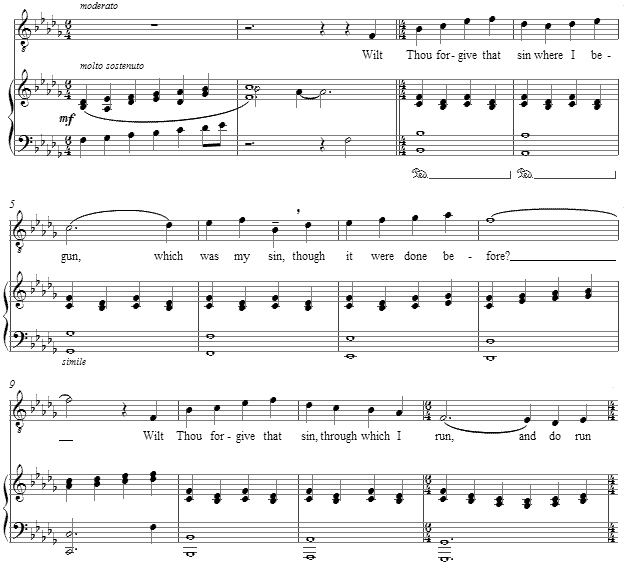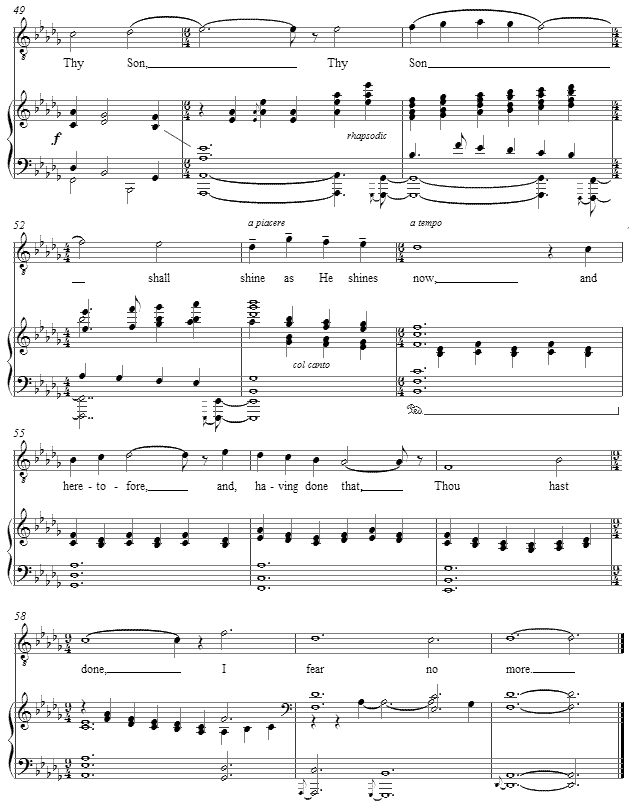Music and Texts of GARY BACHLUND
Vocal Music | Piano | Organ | Chamber Music | Orchestral | Articles and Commentary | Poems and Stories | Miscellany | FAQs
A Hymn to God the Father - (1987)
John Donne
originally for tenor and pianoto the memory of Timothy Jenkins of the Metropolitan Opera,
a friend, colleague, fine tenor and a gentlemani.
Wilt Thou forgive that sin where I begun,
Which was my sin, though it were done before?
Wilt Thou forgive that sin, through which I run,
And do run still, though still I do deplore?
When Thou hast done, Thou hast not done,
For I have more.
ii.
Wilt Thou forgive that sin which I have won
Others to sin, and made my sin their door?
Wilt Thou forgive that sin which I did shun
A year or two, but wallowed in a score?
When Thou hast done, Thou hast not done,
For I have more.
iii.
I have a sin of fear, that when I have spun
My last thread, I shall perish on the shore ;
But swear by Thyself, that at my death Thy Son
Shall shine as he shines now, and heretofore ;
And having done that, Thou hast done ;
I fear no more.
from Poems of John Donne, vol I., E. K. Chambers, ed. London, Lawrence & Bullen, 1896[ 4 pages, circa 3' 00" ]
John Donne
John Donne (1572-1631) was an English poet of the Metaphysical school and dean of St. Paul's Cathedral, London, from 1621-31. He is considered among the greatest love poets in the English language, and is noted as well for his religious verse, treatises and for sermons, which rank among the best of the 17th century. Born of Roman Catholic parents, Donne's mother was a lineal descendant of Sir Thomas More and the daughter of playwright John Heywood. At age 12 Donne studied at the universities of Oxford and Cambridge, though he took no degree from either university because as a Roman Catholic he could not swear the required oath of allegiance to the Protestant queen, Elizabeth. Following his studies Donne probably traveled in Spain and Italy and then returned to London to study law (1591-1594). Then he turned to a comparative examination of Roman Catholic and Protestant theology.
In 1596 he enlisted as a gentleman with the Earl of Essex's successful military expedition against Cádiz, and the following year he sailed with Sir Walter Raleigh and Essex in the near-disastrous Islands expedition, hunting for Spanish treasure ships in the Azores. Returning to London in 1597, Donne became secretary to Sir Thomas Egerton, lord keeper of the great seal, in whose employ Donne remained for almost five years. The appointment itself makes it probable that Donne had become an Anglican by this time. During his tenure with the lord keeper, Donne lived, according to Walton, more as a friend than as a servant in the Egerton household, where Sir Thomas appointed him "a place at his own table, to which he esteemed [Donne's] company and discourse to be a great ornament." While in Egerton's service, Donne met and fell in love with Anne More, niece of Egerton's second wife and the daughter of Sir George More, who was chancellor of the garter. Knowing there was no chance of obtaining Sir George's blessing on their union, the two married secretly, in 1601. For this offense Sir George had Donne briefly imprisoned and dismissed from his post with Egerton as well, denying Anne's dowry to Donne. Because of the marriage, moreover, all possibilities of a career in public service were dashed, and Donne found himself at age 30 with neither prospects for employment nor adequate funds with which to support his household.
During the next 10 years Donne lived in poverty, first on the charity of Anne's cousin in Surrey, then at a house in Mitcham near London, and sometimes in a London apartment, relying on the support of noble patrons. During this time he failed to find employment. Anne bore 12 children, 5 of whom died before they reached maturity. During these years, Donne wrote prose works on theology, canon law, anti-Catholic polemics, love lyrics, religious poetry, and complimentary and funerary verse for his patrons. In 1611-12 he traveled through France and the Low Countries with a newfound patron, Sir Robert Drury. Returning from the continent, Drury provided his family with a house in London.
In 1614 King James I refused Donne's last attempt to win a post at court, but would appoint him to a vocation in the church, and he finally agreed to take holy orders, being ordained deacon and priest in 1615. He was made a royal chaplain and received a doctor of divinity from Cambridge. Two years after his ordination, in 1617, Anne Donne died at the age of 33 after giving birth to a stillborn child. Donne vowed never to marry again, and his bereavement turned him fully to his vocation as an Anglican divine. In 1621, Donne was installed as dean of St. Paul's Cathedral. The power and eloquence of Donne's sermons soon secured for him a reputation as the foremost preacher in the England of his day, and he became a favorite of both Kings James I and Charles I.
In 1623 Donne fell seriously ill, and reflected on the parallels between his physical and spiritual illnesses -- reflections that culminated during his recovery in the prose Devotions upon Emergent Occasions, published in 1624. In 1631, Donne fell fatally ill with stomach cancer, but left his sickbed to preach a final sermon at court. Published posthumously as "Death's Duell" it is considered to be his own funeral sermon.
Almost none of Donne's poetry was published during his lifetime. Most of his poems were preserved in manuscript copies made by and passed among a relatively small circle of poetry lovers. He composed the hymns late in his life, in the 1620s. Donne's Anniversaries were published in 1611-12 and were the only important poetic works by him published in his lifetime. Donne's poetry is marked by strikingly original departures from the conventions of 16th-century English verse. Donne's devotional lyrics and the hymns explore his love for God, sometimes through sexual metaphors, and depict doubts, fears, and a sense of spiritual unworthiness.
The pun in the poem is on John Donne's name itself, as he addresses God to say, " When Thou hast done, Thou hast not done, For I have more." More sin to come, for that is the nature of man, confesses Donne. But his belief in the promise of his religion says boldly that when God has Donne, he shall fear no more. The hymn is therefore a confession and a testament together.
Timothy Jenkins to whose memory this song is dedicated was a fine tenor and equally fine gentleman. I met him at the Met, covering his performances of Parsifal, thereby attending many of his rehearsals and performances. The tessitura of this song -- the range of this hymn lies from D-flat to a high A-flat -- was tailored to his voice, now sadly silenced, and composed prior to his death.

The vocal line rises several times to A-flat, the last being in a broad, legato phrase, under girded by a rhapsodic gesture in the piano, which gives harmonic way from the lengthy sojourn in B-flat minor to a final, affirmative D-flat major.

Timothy Jenkins
A portion of another of Donne's texts, as composed for mezzo soprano, harpsichord and string quintet, is titled All Is One.
The score to A Hymn to God the Father is available as a free PDF download, though any major commercial performance or recording of the work is prohibited without prior arrangement with the composer. Click on the graphic below for this piano-vocal score.A Hymn to God the Father
Tenor edition

